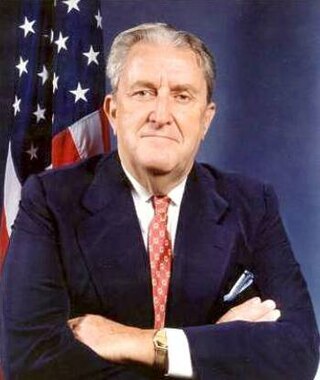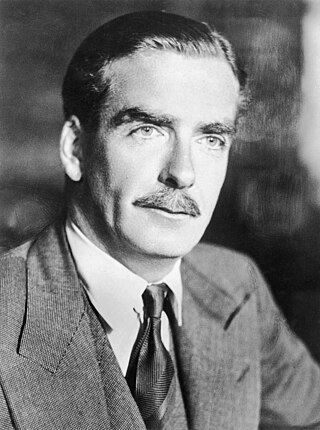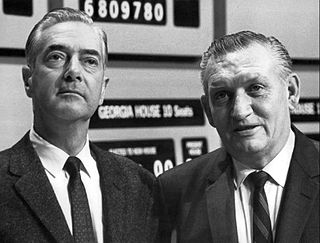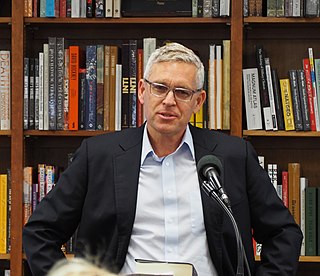
Dwight David Eisenhower, nicknamed Ike, was an American military officer and statesman who served as the 34th president of the United States from 1953 to 1961. During World War II, he served as Supreme Commander of the Allied Expeditionary Force in Europe and achieved the five-star rank as General of the Army. Eisenhower planned and supervised two of the most consequential military campaigns of World War II: Operation Torch in the North Africa campaign in 1942–1943 and the D-Day invasion of Normandy in 1944.

John Foster Dulles was an American politician, lawyer, and diplomat. A member of the Republican Party, Dulles served as United States Secretary of State under President Dwight D. Eisenhower from 1953 until his resignation in 1959 and was briefly a Senator from New York in 1949. He was a significant figure in the early Cold War era, who advocated an aggressive stance against communism throughout the world.

Foreign Affairs is an American magazine of international relations and U.S. foreign policy published by the Council on Foreign Relations, a nonprofit, nonpartisan, membership organization and think tank specializing in U.S. foreign policy and international affairs. Founded on 15 September 1922, the print magazine is currently published every two months, while the website publishes articles daily and anthologies every other month.

The Council on Foreign Relations (CFR) is an American think tank specializing in U.S. foreign policy and international relations. Founded in 1921, it is an independent and nonpartisan nonprofit organization. CFR is based in New York City, with an additional office in Washington, DC. Its membership has included senior politicians, numerous secretaries of state, CIA directors, bankers, lawyers, professors, corporate directors and CEOs, and senior media figures.
The expression military–industrial complex (MIC) describes the relationship between a country's military and the defense industry that supplies it, seen together as a vested interest which influences public policy. A driving factor behind the relationship between the military and the defense-minded corporations is that both sides benefit—one side from obtaining war weapons, and the other from being paid to supply them. The term is most often used in reference to the system behind the armed forces of the United States, where the relationship is most prevalent due to close links among defense contractors, the Pentagon, and politicians. The expression gained popularity after a warning of the relationship's detrimental effects, in the farewell address of President Dwight D. Eisenhower on January 17, 1961.

William Frank Buckley Jr. was an American conservative writer, public intellectual, and political commentator. In 1955, he founded National Review, the magazine that stimulated the conservative movement in the mid-20th century United States. Buckley hosted 1,429 episodes of the public affairs television show Firing Line (1966–1999), the longest-running public affairs show with a single host in American television history, where he became known for his distinctive Transatlantic accent and wide vocabulary.

Vernon Anthony Walters was a United States Army officer and a diplomat. Most notably, he served from 1972 to 1976 as Deputy Director of Central Intelligence, from 1985 to 1989 as the United States Ambassador to the United Nations and from 1989 to 1991 as Ambassador to the Federal Republic of Germany during the decisive phase of German Reunification. Walters rose to the rank of lieutenant general in the U.S. Army and is a member of the Military Intelligence Hall of Fame.

Dwight D. Eisenhower's tenure as the 34th president of the United States began with his first inauguration on January 20, 1953, and ended on January 20, 1961. Eisenhower, a Republican from Kansas, took office following a landslide victory over Democrat Adlai Stevenson in the 1952 presidential election. John F. Kennedy succeeded him after winning the 1960 presidential election.
Lewis Arthur Larson was an American lawyer, law professor, United States Under Secretary of Labor from 1954 to 1956, director of the United States Information Agency from 1956 to 1957, and executive assistant for speeches for U.S. President Dwight D. Eisenhower from 1957 to 1958.

The Making of the Atomic Bomb is a history book written by the American journalist and historian Richard Rhodes, first published by Simon & Schuster in 1987. The book won multiple awards, including Pulitzer Prize for General Non-Fiction. The narrative covers people and events from early 20th century discoveries leading to the science of nuclear fission, through the Manhattan Project and the atomic bombings of Hiroshima and Nagasaki.

This bibliography of Harry S. Truman is a selective list of scholarly works about Harry S. Truman, the thirty-third president of the United States (1945–1953). See also the bibliographies at Harry S. Truman, Presidency of Harry S. Truman, and Foreign policy of the Harry S. Truman administration.

Sir Robert Anthony Eden, 1st Earl of Avon, was a British politician who served as Prime Minister of the United Kingdom and Leader of the Conservative Party from 1955 until his resignation in 1957.

William H. Lawrence was an American journalist and television news personality whose 40-year career as a reporter began in 1932 and included a 20-year stint (1941–61) with The New York Times, for which he reported from major fronts of World War II, Korean War and, subsequently, as the newspaper's White House correspondent. In 1961 he joined ABC News where, for nearly 11 years, he served as the network's political affairs editor and, during his first year, as an evening news anchorman.
The Arnold A. Saltzman Institute of War and Peace Studies (SIWPS) is a research center that is part of Columbia University's School of International and Public Affairs in New York. It was founded in 1951 by President of Columbia Dwight D. Eisenhower as the Institute of War and Peace Studies (IWPS) and was led for its first 25 years by Professor William T. R. Fox. It was given its current name in 2003. By its own description, the institute's researchers analyze "the political, military, historical, legal, economic, moral, psychological, and philosophical dimensions of international relations."
This bibliography of Dwight D. Eisenhower is a list of published works about Dwight D. Eisenhower, the 34th president of the United States.

William I. Hitchcock is the William W. Corcoran Professor of History at the University of Virginia. His work focuses on the history of the 20th century.
William Beatty Pickett is an American historian and professor emeritus at Rose-Hulman Institute of Technology in Terre Haute, Indiana. He is known as an authority on President Dwight D. Eisenhower and Indiana Sen. Homer E. Capehart, and is the author of several well-regarded books on U.S. history including Dwight David Eisenhower and American Power and Eisenhower Decides To Run: Presidential Politics and Cold War Strategy.

Africa–United States relations are the political, economic and cultural ties between the United States and the independent African countries.
The United States foreign policy of the Dwight D. Eisenhower administration, from 1953 to 1961, focused on the Cold War with the Soviet Union and its satellites. The United States built up a stockpile of nuclear weapons and nuclear delivery systems to deter military threats and save money while cutting back on expensive Army combat units. A major uprising broke out in Hungary in 1956; the Eisenhower administration did not become directly involved, but condemned the military invasion by the Soviet Union. Eisenhower sought to reach a nuclear test ban treaty with the Soviet Union, but following the 1960 U-2 incident the Kremlin canceled a scheduled summit in Paris.
Diplomacy at the Brink: Eisenhower, Churchill, and Eden in the Cold War is a 2014 book by David Watry. The book examines the United Kingdom–United States relations during the 1950s, covering the foreign policies of Dwight Eisenhower, Winston Churchill, and Anthony Eden. Upon its release, some publications praised the book's research, whereas aspects of the book's depiction of Eisenhower were criticised by several reviewers.












